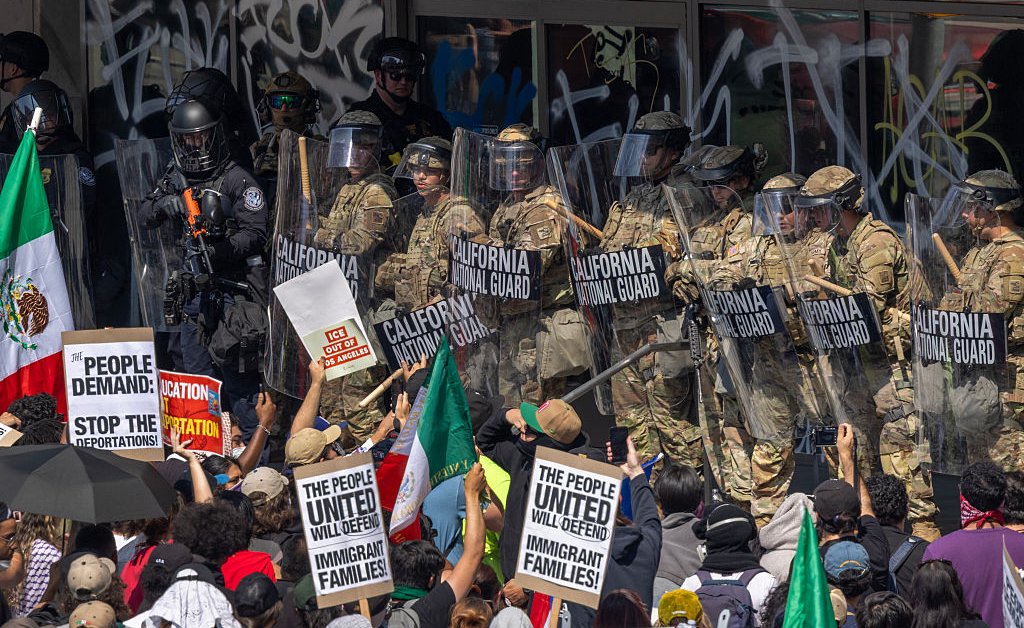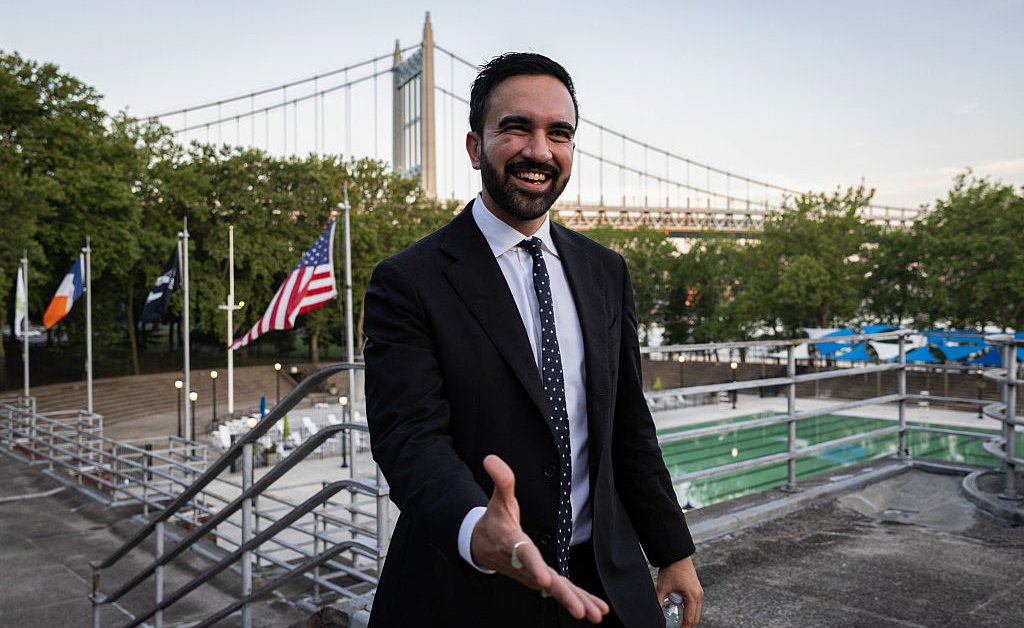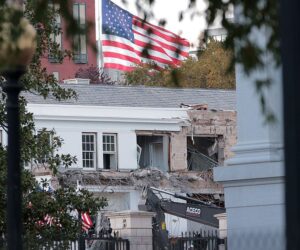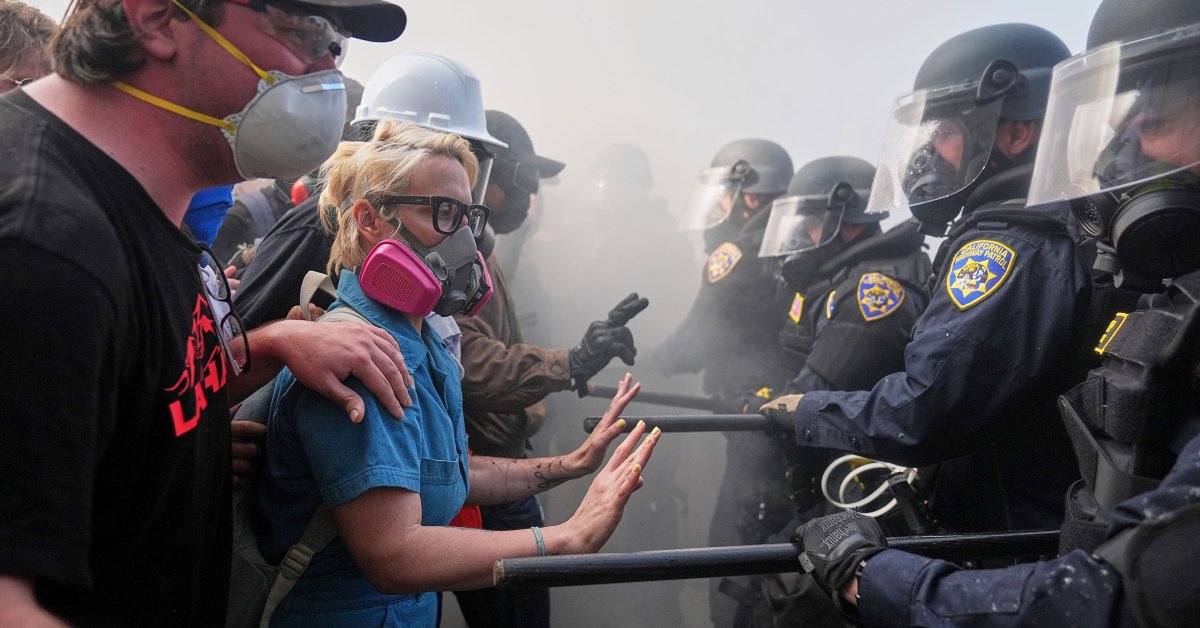The Trump Administration is suing Los Angeles over sanctuary city policies that limit the city’s cooperation with federal immigration enforcement, claiming that they led to “lawlessness” when thousands of people took to the streets earlier this month to protest the President’s mass-deportation operation.
The Department of Justice (DOJ) filed a lawsuit against the city on Monday, alleging that L.A.’s sanctuary city policies are “illegal” and “interfere with and discriminate against the Federal Government’s enforcement of federal immigration law.”
“The practical upshot of Los Angeles’ refusal to cooperate with federal immigration authorities has, since June 6, 2025, been lawlessness, rioting, looting, and vandalism,” the DOJ alleges in the suit. “The situation became so dire that the Federal Government deployed the California National Guard and United States Marines to quell the chaos.”
Trump’s efforts to conduct mass deportations have sparked pushback from voters, politicians, and courts across the country. Earlier this month, thousands of people in L.A. protested Immigration and Customs Enforcement (ICE) raids targeting undocumented immigrants in the city. The demonstrations were largely peaceful, but some escalated amid clashes with law enforcement officers. Trump mobilized National Guard troops to quell the protests against the wishes of Democratic California Gov. Gavin Newsom—a rare and controversial exercise of presidential power that prompted Newsom to sue Trump. In a statement about the suit, Newsom accused the President of “intentionally causing chaos, terrorizing communities, and endangering the principles of our great democracy.”
In a press release announcing the Trump Administration’s lawsuit against L.A. on Monday, Attorney General Pamela Bondi blamed L.A.’s sanctuary city policies as “the driving cause” of the “chaos” during the anti-ICE protests in the city earlier this month.
“Jurisdictions like Los Angeles that flout federal law by prioritizing illegal aliens over American citizens are undermining law enforcement at every level—it ends under President Trump,” she said in the press release.
Here’s what to know about the situation.
What are L.A.’s sanctuary city policies?
On Nov. 19, the L.A. City Council voted unanimously to establish L.A. as a sanctuary city, barring any municipal resources—such as property or personnel—from being used for immigration enforcement purposes.
According to a city councilmember’s press release at the time, the policy “prohibits the direct and indirect sharing of data with federal immigration authorities,” which it called “an important gap to close in our city’s protections for immigrants.”
More than 1.35 million immigrants live in L.A., making up more than 34% of the city’s population, according to the press release.
“More than one out of three people who live in Los Angeles, including my own parents, are immigrants. One in ten are undocumented,” L.A. Councilmember Hugo Soto-Martinez said in the press release. “We refuse to stand by and let Donald Trump deport our neighbors, family, friends, and coworkers.”
What other cities are sanctuary cities?
Many other cities across the country are sanctuary cities, including Chicago, New York, and San Francisco. Roughly a dozen states have put similar policies in place, as have a number of counties.
While there is no legal or universal definition of what a sanctuary city is, jurisdictions that adopt such policies typically restrict the extent to which the local government can share information or cooperate with federal immigration enforcement agents.
Read More: What Are Sanctuary Cities and Why Is Trump Targeting Them?
How has the Trump Administration sought to crack down on sanctuary cities?
Trump’s Administration has targeted sanctuary cities since his second term began. On his first day back in office, Trump signed an Executive Order directing the Attorney General and Secretary of Homeland Security to ensure that sanctuary jurisdictions “do not receive access to Federal funds.” More than a dozen cities and counties sued the Trump Administration and, in April, a federal judge blocked the Administration from denying sanctuary jurisdictions federal dollars.
In February, the DOJ sued the state of Illinois and the city of Chicago, alleging that their sanctuary city policies are interfering with federal immigration enforcement efforts. The Trump Administration has also sued four cities in New Jersey over their sanctuary policies.
The Department of Homeland Security (DHS) in May posted what it referred to as a “comprehensive list” of dozens of jurisdictions that DHS said had such policies in place, accusing them of “deliberately obstructing the enforcement of federal immigration laws and endangering American citizens” and demanding that they “review and revise their policies to align with federal immigration laws.”
“We are exposing these sanctuary politicians who harbor criminal illegal aliens and defy federal law. President Trump and I will always put the safety of the American people first. Sanctuary politicians are on notice: comply with federal law,” DHS Secretary Kristi Noem said in a statement at the time.
The list was removed from the department’s official website days later, after local officials across the country questioned their jurisdictions’ inclusions and criticized the department for a lack of transparency in the process, according to NPR.








